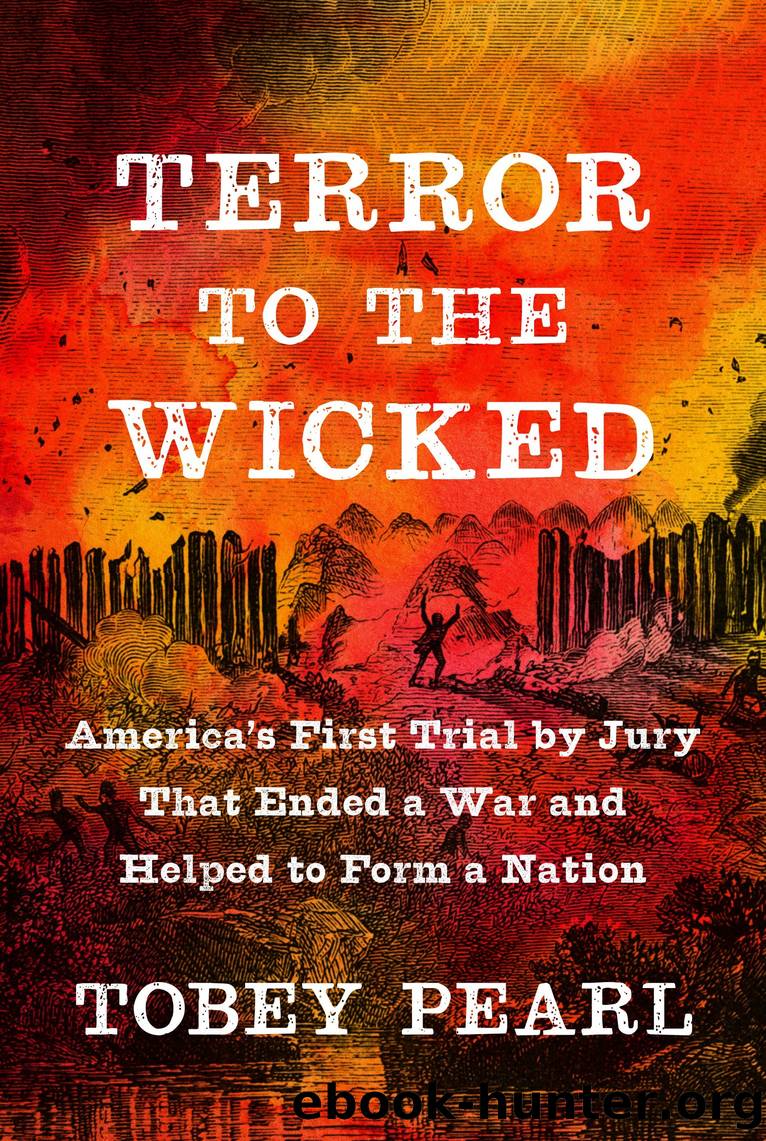Terror to the Wicked by Tobey Pearl

Author:Tobey Pearl [Pearl, Tobey]
Language: eng
Format: epub
Publisher: Knopf Doubleday Publishing Group
Published: 2021-03-16T00:00:00+00:00
* * *
â
The Irish defendantâs insistence that the king of England provide him a lifeline would have bewildered and intrigued the commonsense jurors. The daily life of a juror such as Edward Foster, a farmer, was filled with very different concerns, although he was also vulnerable to repercussions from the trial.
On any other day, Foster likely would have been tending his crops or hunting, maybe taking aim at the slender blackbirds that nimbly perched on early green stalks of rustling corn. The birds cocked their heads, their golden eyes alert to his presence, onyx-sheened wings ready for flight. For every shot Foster took, hundreds of black birds would rush skyward. The flutter of wings above rang out along with the sounds of his musket.
Foster spent his days searching for quarry through dense rows of corn he had hand-seeded alone, not having a son old enough to help him. There was no pleasure in killing a small bird that was not worth eating. The problem was the corn; he needed it to survive. The birds would not leave it alone, eating away his crops. The tribesmen nearby used a different technique, setting up âlittle watch-housesâ in the rippling green fields to shelter their older children, who were at the ready to jump out in the early daybreak hours and scare the millions of chogan euck (blackbirds) away from their staple crop. But even if he had had a son old enough to do it, Foster would not have risked a precious child to such work.
He had already lost one son, Timothy, named for Fosterâs father. The young boy passed away before his first birthday, triggering the singular grief of such a loss. But just recently, as the corn began to break the soil, his next son was born. Again Foster named him Timothy, determined to provide a namesake for his aging father. Already this boy languished with the illnesses that circulated through the colony. Soon enough religious leaders prayed âfor ye healing of a bloody cough among [the settlersâ] children.â
The worried settler must have feared that death stalked him. Praying and working represented his only ballast against tragedy. Foster learned from the Indians, who lived close by, how to work the soil and grow the corn his family needed. He diligently planted several shad fish deep in the soil throughout his morgens, or acres, of land on Scituateâs Second Cliff. He knew that without the fish, the unfertilized corn would not grow.
For Foster, despair competed with optimism. His marriage to Lettice, a strong woman, proved a good one. Letticeâs uncle, Timothy Hatherly, known as the âfather of Scituate,â had financed much of the growth of the small settlement, part of Plymouth Colony, where they lived. The wedding marked a noteworthy occasion, with the colonyâs renowned military captain, Myles Standish, officiating at the civil ceremony. The young couple built their bare-bones clapboard house next to the languorous âSatuitâ Brook, facing Kent Street, the main thoroughfare. The residents had followed Catoâs cardinal rules for colonization: âSecureâ¦pure air, a fresh navigable river and a rich country.
Download
This site does not store any files on its server. We only index and link to content provided by other sites. Please contact the content providers to delete copyright contents if any and email us, we'll remove relevant links or contents immediately.
| Africa | Americas |
| Arctic & Antarctica | Asia |
| Australia & Oceania | Europe |
| Middle East | Russia |
| United States | World |
| Ancient Civilizations | Military |
| Historical Study & Educational Resources |
The Dawn of Everything by David Graeber & David Wengrow(1697)
The Bomber Mafia by Malcolm Gladwell(1620)
Facing the Mountain by Daniel James Brown(1546)
Submerged Prehistory by Benjamin Jonathan; & Clive Bonsall & Catriona Pickard & Anders Fischer(1452)
Wandering in Strange Lands by Morgan Jerkins(1419)
Tip Top by Bill James(1409)
Driving While Brown: Sheriff Joe Arpaio Versus the Latino Resistance by Terry Greene Sterling & Jude Joffe-Block(1370)
Red Roulette : An Insider's Story of Wealth, Power, Corruption, and Vengeance in Today's China (9781982156176) by Shum Desmond(1353)
Evil Geniuses: The Unmaking of America: A Recent History by Kurt Andersen(1346)
The Way of Fire and Ice: The Living Tradition of Norse Paganism by Ryan Smith(1329)
American Kompromat by Craig Unger(1307)
It Was All a Lie by Stuart Stevens;(1296)
F*cking History by The Captain(1294)
American Dreams by Unknown(1277)
Treasure Islands: Tax Havens and the Men who Stole the World by Nicholas Shaxson(1267)
Evil Geniuses by Kurt Andersen(1250)
White House Inc. by Dan Alexander(1207)
The First Conspiracy by Brad Meltzer & Josh Mensch(1167)
The Fifteen Biggest Lies about the Economy: And Everything Else the Right Doesn't Want You to Know about Taxes, Jobs, and Corporate America by Joshua Holland(1117)
